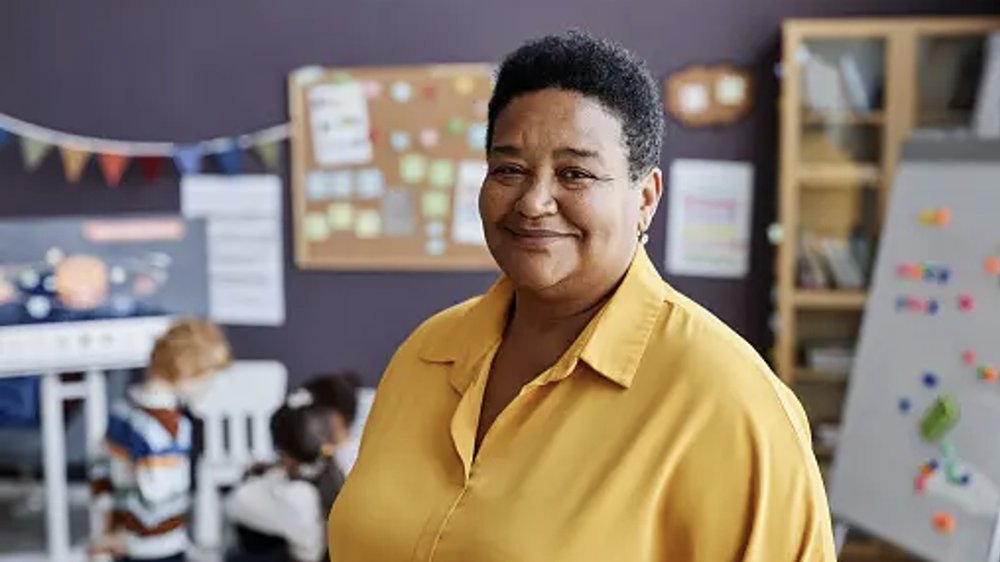Hiring and retaining teachers is a top challenge facing education leaders today. A number of factors contribute to this challenge including emotional burnout, low pay, and poor working conditions such as low staffing levels, lack of mental health support, and low levels of autonomy. Teacher stress and well-being have serious consequences for both teachers and students. In addition to affecting teachers’ physical health, research has shown a relationship between low levels of teacher wellness and lower-quality student learning environments and lower levels of student achievement. Highlighting the critical need for improving job conditions and tackling the challenges related to teacher retention is data showing that the teacher pipeline is in trouble, with the number of college students studying education having declined over the past decade.
Knowing the diversity of challenges facing teachers today, solutions targeting teacher retention must be multifaceted and take a holistic approach that involves collaboration and coordination across stakeholders in the school community. An often underutilized - and powerful - resource in school communities is families. Indeed, decades of research underscore families’ significant influence on positive student outcomes. For example, research has shown that schools with strong parental involvement were ten times more likely than schools with weak parental engagement to see improvements in math scores and children whose families’ engaged in at-home literacy activities demonstrated 2-3 months of literacy gains. Importantly, data also reveal that families’ engagement in their child’s learning has more than twice the effect on student test scores than socioeconomic status or level of educational attainment. As teachers work to support student learning amidst challenging environments, families are a key stakeholder to activate as partners in supporting student success.
So how can family engagement support teachers’ wellbeing and their ability to support student learning in the classroom? Here are a few strategies that can facilitate strong, parent-teacher partnerships, support positive student outcomes, and increase teachers’ job satisfaction:
Families can support students’ academics and behavior at home. Research shows that students perform better academically when their families are involved in their education and can extend classroom learning to the home environment. When teachers share tips and activities to support at-home learning that are aligned with high-quality instructional materials being used in the classroom, students have multiple opportunities to develop and practice key skills. When teachers then see their students making progress and achieving success, they feel a sense of accomplishment and fulfillment in their role, which can contribute to greater job satisfaction and retention. Further, when families reinforce expectations, teachers experience fewer challenges in managing student behavior, leading to a more positive teaching experience.
Families can share key information about students’ individualized needs. Families can give teachers a more comprehensive picture of their child’s needs, interests, and areas of support. This communication helps teachers tailor their instruction to meet the individual needs of each student and activate relevant background knowledge in the classroom, leading to better outcomes for students and increased career fulfillment for teachers.
Families can help teachers feel supported, valued, and empowered in their roles. Open communication and collaboration that acknowledges the meaningful efforts that both teachers and families contribute to students’ success can help boost teachers’ morale and sense of value in their role. By actively supporting teachers, families can contribute to a positive and supportive school environment that promotes job satisfaction for teachers.
Importantly, a number of tools and supports are available to help facilitate the meaningful and ongoing partnership between teachers and families that can help teachers feel supported and want to stay in the classroom. Teachers no longer have to rely on “one size fits all” approaches to family engagement (e.g., in-person touchpoints) that often are inaccessible to many families and, consequently, poorly attended. Instead, teachers have the opportunity to regularly communicate with families in different languages and through different modalities, enabling strong parent-teacher relationships and the opportunity to collaboratively support student success with all families.
For example, a wide range of communication applications exist to facilitate regular communication between teachers and families. These apps allow teachers to communicate important information about assignments, events, and student progress directly to parents' smartphones or computers, facilitating quick and convenient communication. AI-powered communication platforms can also automate routine communications between teachers and families, such as sending reminders, sharing important announcements, or answering frequently asked questions. This frees up teachers' time and ensures that families receive timely and consistent information.
Resources available today also ensure teachers are able to regularly and equitably share key learning-focused information with families. Virtual meeting options allow for parent-teacher conferences to take place outside of the school building and offer greater flexibility for busy parents. By eliminating the need for physical attendance, it is easier for families to participate in school-related events, workshops, and informational sessions. Access to online portals also enable parents to stay informed about their child's academic performance and easily communicate with teachers about any concerns or questions they may have. Further, parent portals often allow families to access student grades, attendance records, and other important information online, empowering families to take an active role in their child's education by providing them with real-time access to academic data and progress reports.
Additionally, connection and collaboration with families who do not share a common language with the teacher can be made possible by language translation tools available to teachers. Translation tools or features within communication platforms can overcome language barriers and ensure effective communication between teachers and diverse families. AI-based language translation tools continue to improve and can provide teachers with the opportunity to automatically translate messages, documents, or communications into multiple languages. By helping teachers communicate important information to families who speak languages other than English, teachers can facilitate greater inclusivity and engagement. Further, language translation can enable critical two-way communication between families and teachers, which supports ongoing partnership in support of student learning.
Family engagement stands as a cornerstone in addressing the multifaceted challenges surrounding teacher retention. By fostering strong partnerships between teachers and families and leveraging technology-based tools and programs as a facilitator, we can create a supportive educational environment for teachers that values collaboration, communication, and mutual respect. Importantly, the benefits of tech-enabled family engagement are wide ranging, including strong parent-teacher partnership, improvements in teacher well-being, improved teacher retention and, ultimately, enhanced student outcomes.
About the Author

Dr. Elisabeth O’Bryon is the Chief Impact Officer and Co-Founder of Family Engagement Lab (FEL), a national nonprofit and leader in the advancement of learning-centered family engagement serving PreK-12 school systems. Prior to launching FEL, Elisabeth served as the Director of Research and Evaluation at GreatSchools, and a Postdoctoral Research Associate at the Yale Center for Emotional Intelligence where she contributed to the development and evaluation of school-based social and emotional learning programming for children, teachers, and families. Elisabeth has a doctorate in psychology and experience providing school psychological services to preschool through high school-age students in both English and Spanish. Elisabeth co-authored 45 Strategies that Support Young Dual Language Learners, a resource that provides practical, developmentally appropriate strategies for supporting children and families from diverse backgrounds and creating inclusive early childhood classrooms that foster the success of young DLLs. Elisabeth is enjoying the many adventures of parenthood











